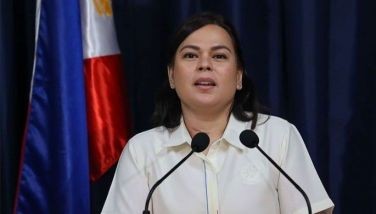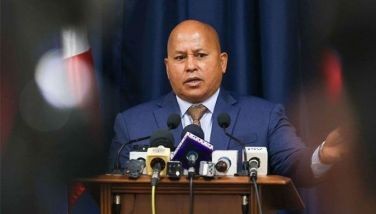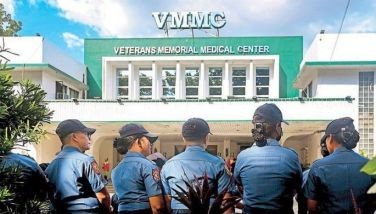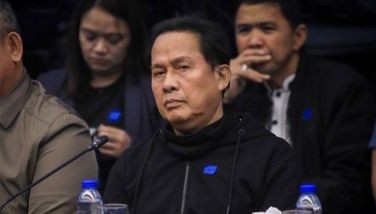GMA rebuffs aide on bloodshed yarn
September 8, 2003 | 12:00am
President Arroyo rebuffed yesterday one of her political advisers who claimed that bloodshed would mar next year’s elections if the 1987 Constitution is not amended.
Presidential Spokesman Ignacio Bunye said the President remains firm in her position not to intervene with the issue of Charter change and will just leave Congress to settle their debate.
"The President’s position on Charter change is very clear," Bunye said. "She has some proposals concerning the matter but she thinks it is untimely for such a move."
He reiterated the Palace position after presidential political liaison officer Jose Rufino claimed the other day that next year’s elections may be bloodier than usual because of intense politicking among police and military officials.
But Bunye rebuffed Rufino, saying the Arroyo administration is giving priority to reforms to help minimize electoral fraud and violence next year.
Bunye said the government is set to implement poll automation and computerized voter registration to lessen fraud.
"The President is working for massive reforms but I don’t think Charter change is the solution," he said.
Bunye said Mrs. Arroyo and the police and military high commands are also instituting measures to strengthen the police and military to lessen politicking.
"Mrs. Arroyo is leaving the matter to both houses of Congress as she would rather focus her time pushing for programs that would promote the economy and the peace and order situation in the country," Bunye said.
He said the Palace disagrees with claims that amending the Constitution is the solution to the country’s problems and stressed that reforms are being pursued to prevent cheating and violence in next year’s polls.
Rufino, executive director of the ruling Lakas-Christian Muslim Democrats (Lakas-CMD) party, said over the weekend that there is a very real possibility that next year’s polls may be bloodier than usual because the police and military establishments have become more "politically active."
But large-scale violence can be avoided, Rufino said, if national leaders discuss amending the 1987 Constitution during a proposed "political summit" and adopt a parliamentary form of government.
A shift to a parliamentary government is one of the constitutional amendments that has long been pushed by congressmen, particularly Speaker Jose de Venecia.
The Speaker was able to include the Charter change issue in the political summit which was suggested by Senate President Franklin Drilon, a proposal welcomed by Mrs. Arroyo and is now being arranged by senior Palace officials.
Drilon said organizers of the political summit have already agreed to include Charter change in the agenda.
He said the Senate agrees with the House on Charter change but there are still differences in the proposed mode of amending it.
Drilon noted the 14 senators have signed a committee report calling for Charter change through an elected constitutional convention but congressmen are supporting Charter change through a constituent assembly.
According to De Venecia’s proposal, the cost of a constitutional convention can be minimized by constituting Congress into a constituent assembly to deliberate on amendments.
Drilon stressed that the political summit would not likely settle the question of how to change the Charter but the changes themselves, such as proposals to introduce a federal government, may be discussed.
The President herself raised the idea of shifting to a federal government in Mindanao when she spoke before the Pacific Economic Cooperation Council meeting held in Brunei Darussalam last week.
Presidential Spokesman Ignacio Bunye said the President remains firm in her position not to intervene with the issue of Charter change and will just leave Congress to settle their debate.
"The President’s position on Charter change is very clear," Bunye said. "She has some proposals concerning the matter but she thinks it is untimely for such a move."
He reiterated the Palace position after presidential political liaison officer Jose Rufino claimed the other day that next year’s elections may be bloodier than usual because of intense politicking among police and military officials.
But Bunye rebuffed Rufino, saying the Arroyo administration is giving priority to reforms to help minimize electoral fraud and violence next year.
Bunye said the government is set to implement poll automation and computerized voter registration to lessen fraud.
"The President is working for massive reforms but I don’t think Charter change is the solution," he said.
Bunye said Mrs. Arroyo and the police and military high commands are also instituting measures to strengthen the police and military to lessen politicking.
"Mrs. Arroyo is leaving the matter to both houses of Congress as she would rather focus her time pushing for programs that would promote the economy and the peace and order situation in the country," Bunye said.
He said the Palace disagrees with claims that amending the Constitution is the solution to the country’s problems and stressed that reforms are being pursued to prevent cheating and violence in next year’s polls.
Rufino, executive director of the ruling Lakas-Christian Muslim Democrats (Lakas-CMD) party, said over the weekend that there is a very real possibility that next year’s polls may be bloodier than usual because the police and military establishments have become more "politically active."
But large-scale violence can be avoided, Rufino said, if national leaders discuss amending the 1987 Constitution during a proposed "political summit" and adopt a parliamentary form of government.
A shift to a parliamentary government is one of the constitutional amendments that has long been pushed by congressmen, particularly Speaker Jose de Venecia.
The Speaker was able to include the Charter change issue in the political summit which was suggested by Senate President Franklin Drilon, a proposal welcomed by Mrs. Arroyo and is now being arranged by senior Palace officials.
Drilon said organizers of the political summit have already agreed to include Charter change in the agenda.
He said the Senate agrees with the House on Charter change but there are still differences in the proposed mode of amending it.
Drilon noted the 14 senators have signed a committee report calling for Charter change through an elected constitutional convention but congressmen are supporting Charter change through a constituent assembly.
According to De Venecia’s proposal, the cost of a constitutional convention can be minimized by constituting Congress into a constituent assembly to deliberate on amendments.
Drilon stressed that the political summit would not likely settle the question of how to change the Charter but the changes themselves, such as proposals to introduce a federal government, may be discussed.
The President herself raised the idea of shifting to a federal government in Mindanao when she spoke before the Pacific Economic Cooperation Council meeting held in Brunei Darussalam last week.
BrandSpace Articles
<
>
- Latest
- Trending
Trending
Latest
Trending
Latest
Recommended


































